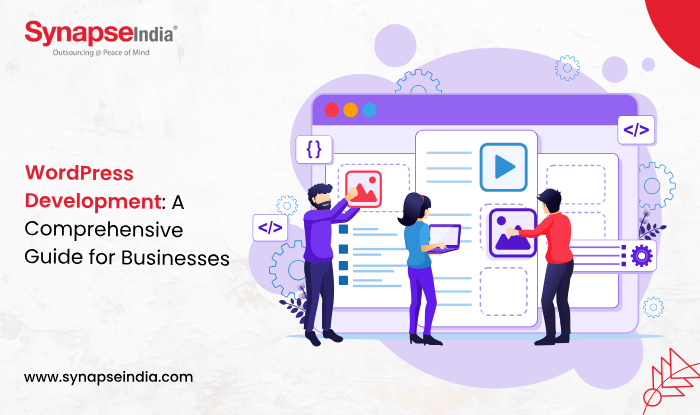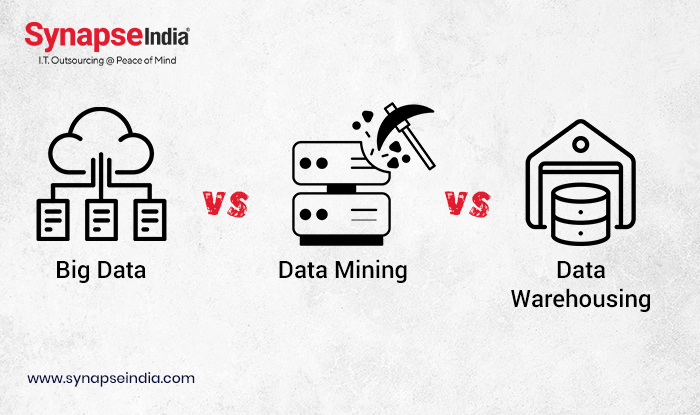 16 Nov 2024
16 Nov 2024“Known for its flexibility and ease of use, WordPress is ideal to create a simple site or scale to a complex enterprise solution. Professional WordPress development enables you to handle projects with enhanced efficiency and uncompromised performance.”

For businesses seeking a professional, user-friendly, and scalable web presence, WordPress is an excellent choice. Users of different skill levels, low to high, can effortlessly use this platform for creating and managing content, whether you want to create simple blogs or some complex eCommerce website. Check out this comprehensive WordPress guide to learn everything worth knowing about WordPress. From its types, features, and benefits to easy implementation steps, this article will help you discover different aspects of WordPress.

WordPress is a leading content management system that offers a versatile and powerful platform to create and publish content. Its robust and flexible framework makes it ideal for businesses of all sizes, enabling them to create customized, feature-rich websites tailored to their unique needs. WordPress makes it easy to manage users, and customize your site, even for users with minimal technical expertise. This is in fact one of the most popular reasons why most businesses want to go for WordPress for their website. Using WordPress you can manage content, update pages, and add functionality through its intuitive dashboard very quickly and easily.
WordPress offers a vast library of plugins and themes allowing businesses to extend functionality effortlessly. Built with SEO in mind WordPress comes with capabilities to empower businesses to optimize their content and improve visibility on search engines. Additionally, WordPress is highly scalable, accommodating business growth. It supports everything from small portfolios to complex enterprise websites. The platform's active community ensures regular updates, robust security, and abundant support resources.
The features and benefits offered by WordPress are major reasons why it is so popular among web developers. Not only is it very easy to use and facilitates customization but it is also highly cost-effective with enhanced security and strong community support available for its users. The wealth of features and benefits make WordPress the go-to choice for businesses seeking a powerful online presence. Let us have a look at some of the features and benefits of WordPress development in detail:
WordPress offers an intuitive dashboard, allowing users to easily manage and update content without technical expertise. This ease of use empowers businesses to maintain their websites in-house, saving time and costs.
With thousands of themes and plugins, WordPress provides extensive customization options. Businesses can create unique, branded websites with functionalities tailored to their needs, such as e-commerce, booking systems, or membership portals.
Being open-source, WordPress eliminates hefty licensing fees. Combined with affordable hosting and development costs, it’s a budget-friendly solution for businesses of all sizes.
WordPress integrates with numerous third-party tools, such as CRM systems , payment gateways, and email marketing platforms, streamlining business operations.
The global WordPress community offers abundant resources, including forums, tutorials, and regular updates, ensuring businesses have the support they need to thrive.
WordPress is a versatile platform that caters to various business needs. Its flexibility allows companies to create websites tailored to their goals and target audience. The key types of WordPress websites for businesses include:
Ideal for showcasing company information, corporate websites highlight services, achievements, and company values. These sites often include blogs, contact forms, and career sections to engage clients and employees.
With plugins like WooCommerce , WordPress transforms into a powerful e-commerce platform. Businesses can sell products, manage inventory, and process payments seamlessly, making it perfect for online stores.
Creative professionals, such as designers, photographers, and writers, use WordPress to display their work. These visually appealing sites highlight projects and skills, serving as digital resumes.
WordPress began as a blogging platform and remains a top choice for content-driven sites. Businesses use blogs to share industry insights, build authority, and connect with audiences.
WordPress supports membership sites where businesses can offer exclusive content, courses, or services through subscriptions.
Event planners and service-based businesses can use WordPress to enable online bookings, ticket sales, and event management.
WordPress development involves creating, customizing, and optimizing websites on the WordPress platform. Here are the key aspects of WordPress development:
Themes determine the design and layout of a website. WordPress developers can create custom themes or modify existing ones to reflect a business’s branding and functional needs. A well-designed theme ensures a user-friendly experience and responsive design across devices.
Plugins extend the functionality of a WordPress website. Developers can create custom plugins to add specific features like e-commerce functionality, social media integration, or SEO tools. The vast ecosystem of plugins allows businesses to enhance their site with minimal effort.
WordPress allows the creation of custom post types (e.g., portfolios, testimonials) and taxonomies (e.g., categories, tags) to organize and display content in unique ways. This flexibility is essential for businesses that need to present content beyond standard posts and pages.
WordPress developers can optimize websites for search engines by implementing best practices such as clean code, meta tags, schema markup, and using SEO plugins like Yoast or Rank Math to improve site visibility.
WordPress development also includes implementing security measures such as regular updates, firewalls, and secure login protocols to protect websites from cyber threats.
The WordPress development process involves several structured steps to create a functional, user-friendly, and tailored website. This structured process ensures that WordPress websites are professional, functional, and aligned with business objectives.
Here's an overview of the key stages:
Under requirement analysis, the WordPress development company works toward understanding the client’s goals, target audience, and the features required from the website. Detailed discussions help outline the website’s purpose, design preferences, functionality, and content structure.
Based on the requirements, developers create a sitemap and wireframes to map out the website’s structure and layout. The design phase focuses on creating a visually appealing and brand-consistent user interface. Developers may choose existing themes or design custom themes.
In this stage, the WordPress platform is set up on a hosting server. Developers install WordPress, customize themes, and develop or integrate plugins for additional functionality, such as contact forms, e-commerce features, or SEO tools. Custom code is written as needed and content is added to the website.
Thorough testing is performed to ensure that the WordPress website functions smoothly across devices and browsers. Developers check for responsiveness, load speed, and functionality of all features, including forms, links, and plugins. Once the website is finalized, it is launched on the live server. Developers ensure a smooth transition from the development environment to the production environment.
Post-launch, ongoing maintenance ensures the website remains secure and up to date. Regular backups, updates to themes and plugins, and monitoring for performance issues are key to long-term success.
The cost of WordPress development varies depending on the complexity and requirements of the project. Basic websites using pre-designed themes may cost less, while custom designs and advanced functionalities can be a little expensive.
Key cost factors include hosting, domain registration, premium themes, plugins, custom development, and ongoing maintenance. Budgeting should account for additional costs like SEO, security measures, and updates.
Businesses can reduce costs by using free tools and templates but may sacrifice customization. Hiring skilled developers ensures a high-quality, scalable website that aligns with business goals.
While WordPress is a versatile and powerful platform, businesses may face several challenges during development. Understanding these can help in planning and mitigating risks effectively. By proactively addressing these challenges, businesses can leverage WordPress to build secure, high-performing, and scalable websites.
As a popular platform, WordPress is a frequent target for hackers. Outdated themes, plugins, or core software can expose websites to security risks. Implementing robust security measures and regular updates is essential to safeguard sensitive data.
Relying on multiple plugins can lead to compatibility issues. Conflicts between plugins or with the WordPress core may cause functionality problems or site crashes. Testing and using only reputable, updated plugins can minimize these risks.
Slow-loading websites can drive users away. Poorly coded themes, excessive plugins, or unoptimized images often result in sluggish performance. Leveraging caching, image compression, and content delivery networks (CDNs) can improve speed and user experience.
While WordPress offers extensive customization, achieving specific features or designs may require advanced coding knowledge. Hiring skilled developers is crucial for businesses needing tailored solutions.
The WordPress ecosystem is continuously evolving, offering innovative solutions for businesses to enhance their digital presence. Here are some key trends shaping the future of WordPress development:
Headless CMS architecture , where WordPress serves as a backend while the front end is built using modern frameworks like React or Vue.js, is gaining traction. This approach enables faster websites, improved scalability, and seamless integration with other platforms.
Artificial Intelligence is transforming WordPress websites. AI-powered tools are being used for chatbots, personalized recommendations, advanced analytics, and automated content creation, enhancing user experience and efficiency.
As voice search becomes mainstream, WordPress developers are focusing on optimizing websites for conversational queries by implementing schema markup and voice-friendly design.
WordPress is increasingly used to create PWAs , which combines the best of websites and mobile apps. This trend helps businesses deliver faster, offline-accessible, and app-like experiences.
Starting with WordPress development for your business is straightforward, thanks to its user-friendly interface and extensive resources. Here’s a step-by-step guide:
Determine your website's purpose, target audience, and desired features. Whether it’s e-commerce, blogging, or a portfolio site, a clear vision helps guide the development process.
Select a memorable domain name that aligns with your brand. Pair it with a reliable hosting service optimized for WordPress to ensure optimal performance and uptime.
Most hosting providers offer one-click WordPress installations, making setup quick and easy. Alternatively, you can manually download WordPress from WordPress.org and upload it to your server.
Choose a theme that reflects your brand and meets your functional needs. Start with a free or premium theme or invest in a custom design for a unique look. Enhance your site’s functionality with plugins for SEO , security, and performance.
Tailor the website to your brand with custom layouts, fonts, and colors. Add engaging, optimized content to attract and retain visitors.
Test your website for responsiveness, speed, and functionality. Once satisfied, launch it and promote it to your audience.
Partnering with a professional WordPress development company ensures high-quality, customized solutions for your business. These companies bring expertise in designing, developing, and optimizing WordPress websites tailored to your unique needs. From creating responsive designs to integrating advanced functionalities like e-commerce or custom plugins, they handle every aspect of the development process efficiently. Moreover, they also ensure that your website features robust security and scalability and is optimized for search engines.

With proper knowledge and the right strategy in place, WordPress development can be a piece of cake. Having a well-developed WordPress website can play a significant role in the success of your business. If you are in need of a highly efficient WordPress website that meets all your business objectives, it is highly recommended that you partner with a WordPress development company .


 27 Jan 2024
27 Jan 2024
